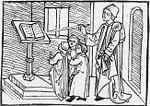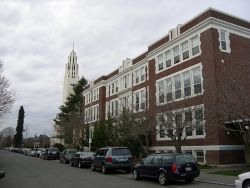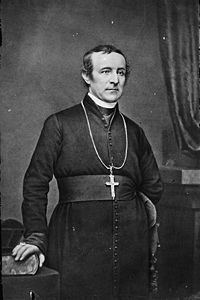Parochial school
| Schools |
|---|
| Education |
| History of education |
| Pedagogy |
| Teaching |
| Homeschooling |
| Preschool education |
| Child care center |
| Kindergarten |
| Primary education |
| Elementary school |
| Secondary education |
| Middle school |
| Comprehensive school |
| Grammar school |
| Gymnasium |
| High school |
| Preparatory school |
| Public school |
| Tertiary education |
| College |
| Community college |
| Liberal arts college |
| University |
Parochial school is one term used (particularly in the United States) to describe a school that engages in religious education in addition to conventional education. In another, more narrow sense, parochial schools are Christian grammar schools or high schools run by parishes; but this distinction is not universally made.
Etymology and usage
The word Parochial is an adjective which means "of or pretaining to a parish", and comes from the Middle English parochialle.[1] The term, parochial school is sometimes used specifically to refer only to schools attached to Roman Catholic parishes or dioceses. In other usages, it may include Protestant, Jewish, Muslim and other religious schools, and may even be used as a blanket term for all privately operated schools.
History
Originally, schools in the western world, and in many other parts of the world, were religious institutions. These early schools were often responsible in training the clergy in religious doctrine. In Europe, the Roman Catholic Church opened some of the earliest schools. Eventually, other studies, such as the Classics, mathematics, rhetoric, logic, natural sciences, art and other subjects started to be introduced into the curriculum. By the time of the Renaissance, schools had become places for both religious and secular education.
In the United States, the country with the largest number of parochial schools, the Catholic Church established a series of private schools connected to parishes in the late 19th century as a way to curtail the growing influence of Protestantism on education and society.[2] At first creating parochial schools presented many challenges; parishes were forced to provide enough money for the proposed schools, but not all parishes, especially those in more rural areas with smaller congregations had the financial capacity to do so; tensions among Protestants and Catholics meant that in predominantly Protestant areas such attempts to were belittled and even occasionally met with violence[3]; and lastly, attendance at first was low and sometimes did not justify the cost. But parochial schools persisted, and by the beginning of the twentieth century were increasing their enrollment exponentially. In fact, the beginning half of the twentieth century was perhaps the best in terms of enrollment size and popularity for parochial schools as many new parents, some not even Catholic, say the educational benefits and advantages that such schools held for their children over public schools.[4]
Enrollment started to decline slightly after the 1960s. Cost of tuition and sometimes defection away from the Catholic church and its dogmas made some parents decide that the improving public schools, which they were already paying for in taxes, would be a better place for their children to attend. The increase in non-Catholic parochial schools also lead those who were not Catholic but sent their children to parochial schools because of the quality of education to switch to schools that were linked directly to their own denomination of worship. While parochial schools have not regained the same level of enrollment they once held, they are still popular types of schools found throughout the U.S.
Governance
Parochial schools are generally not required by law to operate under the same standards as a public (government-operated) school; however, the differences of law vary from state to state. Most schools, although not required, do operate under, and even exceed, public school standards, as a way of preparing their students adequately for further education. Parochial schools recieve no funding from any level of government. Often times tuition is charged in order to help supplement funding from the parish it is connected to. The schools are often administered by the local branch of whichever church it is affliated with. Although most Christian affliated schools may have started with clergy as faculty, the demands for teachers has caused many religious schools to hire non-clergy as teachers and sometimes even administrators.[5] Religious instruction is usually added to the subjects taught in a public school.
Parochial schools are generally smaller than public schools, often having only one teacher and classroom per grade level. Many students attend parochial schools only through the end of the eighth grade, completing their final four years of school in a public high school. Catholic high schools, rather than being attached to a specific parish (whose population would be too small to support it), tend to be administered by local dioceses or by religious orders, and are sometimes attached to Catholic universities.
Non-Christian Affliated Schools
Contraversy
In contemporary times, there are several points of contraversy with parochial schools in the United States. One has to do with the issue of school vouchers, a program which has been debated on both the state and federal level. Since school is compulsory in the U.S. until around the age of 18 in most states, some families find that they are forced to send their children to poorly funded and managed public schools, because they lack the money to pay tuition at parochial schools. Other families deem it unfair that they must pay for public schools through property taxes, wheither they choose to send their children to parochail or public schools. Under the school voucher program, families that wish to send their children to porachial schools would recieve a tax voucher for the tuition they pay. The contraversy from the proposal stems first from the seperation of Church and State in America, and that a tax rebate is a form of subsidizing a religious institution. Others argue that it takes resources away from public schools which house and educate more students than parochial schools.
Other issues include the type of education offered at parochial schools, particularly when it comes to subjects that may conflict with religious instruction. The most famous is the issue of Human evolution which many parochail schools will not teach, subsituting religious doctrine or the theory of creationism.
United Kingdom
- Further information: faith schools
In British education, parish schools from the established church of the relevant constituent country formed the basis of the state-funded education system, and many schools retain a church connection while essentially providing secular education in accordance with standards set by the government of the country concerned. These are often primary schools, and may be designated as name C.E.[6] School or name C.E. (Aided) School, depending on whether they are wholly or partly funded by the church (the latter is more common). English education includes many schools linked to the Church of England which sets the ethos of the school and can influence selection of pupils where there is competition for places. These form a large proportion of the 6,955 Christian faith schools in England. The Roman Catholic church also maintains schools. In addition, there are 36 Jewish, seven Muslim and two Sikh faith schools. Faith schools follow the same national curriculum as state schools. Religious education in Church of England schools is monitored by the local diocese, but does not typically take up much more of the timetable than in secular schools. Although not state schools, there are around 700 unregulated madrassas in Britain, attended by approximately 100,000 Muslim children. Doctor Ghayasuddin Siddiqui, the leader of the Muslim Parliament of Great Britain, has called for them to be subject to government inspection following publication of a 2006 report which highlighted widespread physical and sexual abuse.[7]
There is a debate over the question of whether faith schools should receive government funding, with an ICM poll in August 2005 finding 64% of the public believe that "the government should not be funding faith schools of any kind." It also found a significant part of the population against faith based schools being legal at all, citing potential damages to a multicultural society as their main reason. A petition exists on the Downing Street website to abolish state funding and prohibit the teaching of creationism as fact in schools.
Scotland has its own educational system, distinct from that of England and Wales. Although schools existed in Scotland prior to the Reformation widespread public education in Scotland was pioneered by the Church of Scotland, which handed over its parish schools to the state in 1872. Charitably funded Roman Catholic schools were brought into the state system by the Education (Scotland) Act 1918. This introduced state funding of Catholic schools which kept their distinct religious education, access to schools by Catholic clergy and requirement that school staff be acceptable to the Church. The Catholic schools remain as "faith schools." The others are effectively secular and are known as "non-denominational" schools. The subject of religious education continues to be taught in these non-denominational institutions, as is required by Scots Law.
In Scottish Catholic schools employment of non-Catholics can be restricted by the Church; often, one of the requirements for Catholic applicants is to possess a certificate which has been signed by their parish priest, although each diocese has its own variation on the method of approval.[8] Non-Catholic applicants are not required to provide any religious documentation.[citation needed] Certain positions, such as headteachers, deputy heads, religious education teachers and guidance teachers are invariably Roman Catholic.[8] Unlike in England and Wales, Scottish schools do not normally have the practice of school-wide daily assembly/worship; this applies even to denominational schools. Whilst maintaining a strong Catholic ethos, Scottish Catholic schools have long welcomed pupils from other faith backgrounds, though they tend to give precedence to non-Catholics who come from families of faith.
Notes
- ↑ parochial. (n.d.). Dictionary.com Unabridged (v 1.1). Retrieved August 05, 2008, from Dictionary.com website: http://dictionary.reference.com/browse/parochial
- ↑ "parochial school." The Columbia Electronic Encyclopedia, Sixth Edition. Columbia University Press., 2003. Answers.com 05 Aug. 2008. http://www.answers.com/topic/parochial-school
- ↑ (2008) National Catholic Educational Association "A Brief Overview of Catholic Schools in America" Retrieved August 10, 2008
- ↑ "parochial school." The Columbia Electronic Encyclopedia, Sixth Edition. Columbia University Press., 2003. Answers.com 05 Aug. 2008. http://www.answers.com/topic/parochial-school
- ↑ "parochial school." The Columbia Electronic Encyclopedia, Sixth Edition. Columbia University Press., 2003. Answers.com 05 Aug. 2008. http://www.answers.com/topic/parochial-school
- ↑ Church of England
- ↑ Alexandra Smith. "Call for national register of mosque schools", The Guardian, 2006-03-22.
- ↑ 8.0 8.1 Gordon Cairns. "My lack of faith stopped me being accepted", The Guardian, 2007-12-04.
ReferencesISBN links support NWE through referral fees
External links
- National Parochial School Directory (US)
- Catholic Parochial School statistics 1993-4 (US)
- The Guardian, 23 August 2005, "Two thirds oppose state aided faith schools" in United Kingdom
- UK Government Petition Website - Faith Schools [1]
Credits
New World Encyclopedia writers and editors rewrote and completed the Wikipedia article in accordance with New World Encyclopedia standards. This article abides by terms of the Creative Commons CC-by-sa 3.0 License (CC-by-sa), which may be used and disseminated with proper attribution. Credit is due under the terms of this license that can reference both the New World Encyclopedia contributors and the selfless volunteer contributors of the Wikimedia Foundation. To cite this article click here for a list of acceptable citing formats.The history of earlier contributions by wikipedians is accessible to researchers here:
The history of this article since it was imported to New World Encyclopedia:
Note: Some restrictions may apply to use of individual images which are separately licensed.


